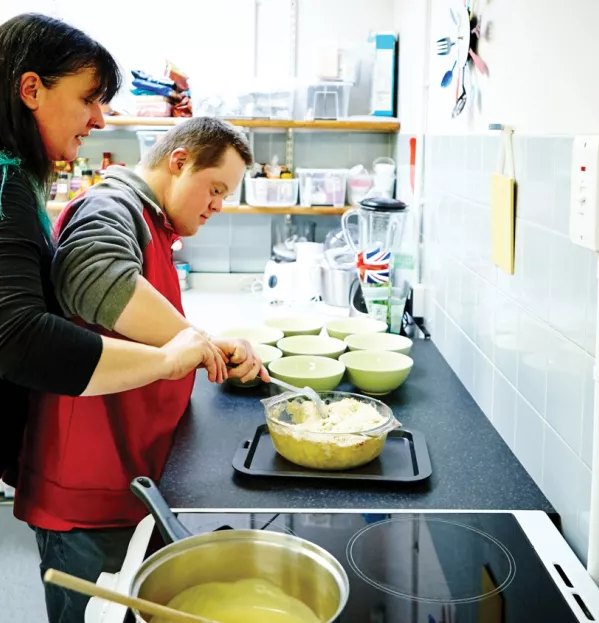Look beyond the disability and appreciate the ability

Closing the employment gap between able and disabled people isn’t rocket science. It is all about engagement - getting employers to change their perceptions and see the ability, not the disability.
We are a specialist training academy for 72 young people with learning disabilities in Minehead, Somerset. We train young people to enter work in the hospitality and catering trade, and 86 per cent of our learners over the past six years have gone into employment.
We are not alone in that success rate. Other specialist colleges achieve similarly high rates.
The secret? Our learners are work-ready and that happens through our tailored education and work placements. Like many specialist FE colleges, we also invest a great deal in engaging with employers to ensure that the graduate and the job are a good fit.
Our learners receive training and achieve the qualifications they need to get into the hospitality and catering industry. We train young people aged between 16 and 25 in our business, Foxes Hotel. It is a real hotel, with real people doing real shift work - subject to the rigours of TripAdvisor.
Expectations are critical to success. We expect our learners to train within this environment: to turn up on time, correctly dressed and ready to learn. They are expected to complete a six-hour shift in food preparation, food service or housekeeping.
Stumbling block
Learners achieve industry-recognised qualifications such as level 1 and 2 food hygiene certificates, City & Guilds employability awards and functional skills qualifications.
Our graduates are work-ready, they want to work and, like all other graduates, they want to lead successful lives. And here is the stumbling block. Too many employers only see the disability, or what they perceive to be the disability.
They first think about what the young people cannot do, rather than what they can do. Never mind that they turn up on time every day, ready for work, with some of the lowest sick rates among workers. Never mind their skills and work ethic.
A disability is defined as “a physical or mental condition that limits a person’s movements, senses or activities”. We all have limitations. Is it really beyond the realm of possibility that we can accommodate these limitations, and make reasonable adjustments in the workplace? This isn’t charity. Research shows that employing people with disabilities adds real value to a business.
The main reasons for people with a disability not being employed are: lack of opportunity; difficulty with transport; and prejudice or discrimination. Research has shown that 67 per cent of people admit to feeling uncomfortable talking to disabled people and 36 per cent believe they are less productive.
The main reasons for people with a disability not being employed are: lack of opportunity; difficulty with transport; and prejudice or discrimination
These issues need to be tackled head-on. We are the second largest employer in Minehead - our learners live and train within this community. They are out there and visible, actively engaging with people as part of daily life.
We use external work placements within our community to challenge perceptions and prejudice towards learning disabilities. This, more than anything, breaks down barriers. Employers begin to see the ability, not the disability, and also what such diversity brings to their organisation and their employees.
For example, Cream, a popular local cafe serving bistro food and employing 20 staff, has taken six learners on work-experience placements. Like many of the employers we work with, the manager praises the learners’ positive attitude and work skills.
As part of our “pathway to life” course, we have units that specifically address transport and communication within the community. From day one, our learners use public transport. When they have their external work placements, they are initially supported to get to and from the work placement, but this support is gradually withdrawn until the learner travels independently.
Positive partnerships
We have a transition team to set up, coordinate and sustain placements, partnerships and employment opportunities. They lead a final-year review meeting that is attended by the learner, their parents and representatives from their local authority. The aspirations and the support required are set out clearly in an action plan, a copy of which is sent to everyone invited to the review.
What never stops is the communication - whatever the placement - and that is the key to sustainable income. It is one thing getting the learner on a work placement but another for the placement to continue after you step away.
That can only be done by working in a partnership, such as the one we have with Hilton Worldwide. Once a placement has been secured, we train the company’s employees to understand the young person’s particular disability, how to support and mentor them, and also about safeguarding. This is a two-way process: it helps us to closely job-match and the employer benefits from training in disability, diversity and equality.
Employers often don’t understand what a person with disabilities can bring to a team. They see employing a person with disabilities as a huge challenge, when in fact it often takes only small steps to integrate someone into the workplace.
People with disabilities find innovative ways to do things. The secret is not to allow the fear of taking on a person with disability to turn into apathy.
Tracey Clare-Gray is principal of Foxes Academy in Minehead, Somerset
You need a Tes subscription to read this article
Subscribe now to read this article and get other subscriber-only content:
- Unlimited access to all Tes magazine content
- Exclusive subscriber-only stories
- Award-winning email newsletters
Already a subscriber? Log in
You need a subscription to read this article
Subscribe now to read this article and get other subscriber-only content, including:
- Unlimited access to all Tes magazine content
- Exclusive subscriber-only stories
- Award-winning email newsletters